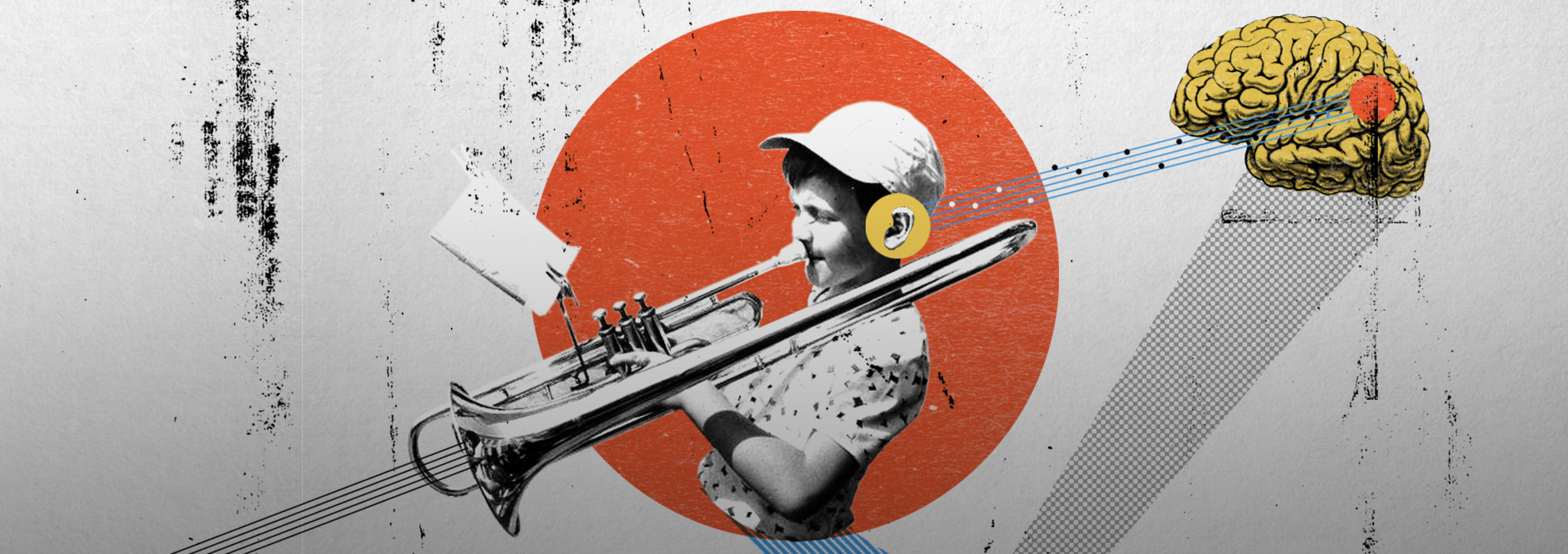Growing up, your mom told you to practice the piano. When you asked why, she would either say, “Because it’s good for you!” or, “Because I said so!” Perhaps this led to you feeling frustrated and eventually giving up the instrument. It’s a common occurrence.
Now that you’re older, you know that playing an instrument might be fun, but you can’t come up with a compelling reason why it should take away time from other important things. Or maybe you want to get started but your significant other thinks it might be a waste of time.
Mom knew it was good, but she probably wasn’t aware of the details. Fortunately, today’s scientific research on the brain reveals many amazing and surprising benefits to learning music at any age.
Here are nine very good reasons to start playing an instrument, all related to your brain. Once you’ve read them, you’ll have to come up with reasons not to play an instrument.
1. Playing Music Increases Our Connection To Others

This won’t come as a surprise to anyone who has played in a band. Scientific research suggests that playing music with others actually strengthens our connections with those people.
As Jill Suttie from Berkley writes:
Performing music involves coordinating of our efforts, too… at least if we want to produce a pleasing sound. According to researchers, when we try to synch with others musically – keeping the beat or harmonizing, for example – we tend to feel positive social feelings towards those with whom we’re synchronizing, even if that person is not visible to us or not in the same room. Though it’s unclear exactly why that happens, coordinating movement with another person is linked to the release of pleasure chemicals (endorphins) in the brain, which may explain why we get those positive, warm feelings when we make music together.
Playing in a band is an experience like no other. It forces close communication with your bandmates to stay in sync and avoid musical trainwrecks. This close communication leads to close connection, which often translates into deeper friendships.
2. Learning An Instrument Strengthens Memory and Reading Skills
Good news for children: learning an instrument can significantly improve both verbal memory and childhood literacy. In other words, when children learn instruments, they remember more and read more effectively.
Childhood reading skills translate into success or failure later in life. Low reading skills significantly hamper a child’s ability to succeed in their career.
A study in 2011 at the Auditory Neuroscience Laboratory at Northwestern University concluded that:
Both musical ability and literacy correlated with enhanced electrical signals within the auditory brainstem. Structural equation modeling of the data revealed that music skill, together with how the nervous system responds to regularities in auditory input and auditory memory/attention accounts for about 40% of the difference in reading ability between children. These results add weight to the argument that music and reading are related via common neural and cognitive mechanisms and suggests a mechanism for the improvements in literacy seen with musical training
Let’s paraphrase that into layman’s speech. Both musical ability and literacy show increased electrical signals in the brain, demonstrating that music and reading both tap into the same brain abilities. In even simpler terms, learn music and read more effectively.
And let’s not assume that these benefits dissolve after early childhood! The brain is adaptable, and learning an instrument most likely transfers similar benefits to adults.
3. Even Babies Benefit From Music Lessons

This may surprise you, but even very young children can benefit from musical training. How young? Before they can even walk or talk!
In fact, a study at McMaster University discovered that babies who were part of interactive music classes showed better early communication skills, such as pointing at things. On top of that, the babies smiled more!
Remember, the brains of young children are moldable and respond more effectively to teaching. Teaching babies some form of music at a young age translates into a happier baby, which is something every parent wants.
Any adult who has played an instrument can also testify to the joy music brings. When you watch the face of someone like Stevie Ray Vaughn or Jack White, it’s obvious that playing music makes them happy. Clearly, music creates overall happiness in the brain.
4. Trained Musicians Can Process Multiple Things At Once
Being able to process multiple things at once can be hugely beneficial, especially when trying to sort through multiple sights and sounds coming at you, such as in a city or crowded office. It turns out that musicians have a distinct advantage in this respect.
Because music requires the ability to process sound, sight, and touch at the same time, it leads to superior multisensory skills (the ability to process multiple sensory experiences at once).
A 2013 study noted that musicians have an advantage when it comes to integrating hearing, touch, and sight:
The ability of the nervous system to integrate information from all senses—sight, sound, touch, smell, self-motion, and taste—is critical to day-to-day life, but even more important for some specific pursuits. High-level musical ability requires a variety of sensory and cognitive abilities developed over the course of years of training. Recent research has revealed that long-term musical training improves the brain’s ability to adapt, and shapes brain regions involved with audiovisual processing.
This shouldn’t come as a shock, especially for anyone who has played in a band. It requires listening to your own instrument, the instruments of your bandmates, playing your instrument, and maintaining visual contact with other band members. It’s a total sight, sound, touch experience.
5. Early Training Leads To Later Brain Plasticity

This is utterly amazing and should profoundly affect the way we think about the importance of musical training for children. A 2012 study found that children who received musical training, and then stopped playing their instrument for decades, still reaped the benefits as adults.
These adults demonstrated a faster brain response to speech than those who had never played an instrument.
Why is this? Part of the answer may lie in the way our brains process sound. As we get older, it becomes more difficult to interpret sounds which change quickly, such as speech. Have you ever noticed how hard it is for adults to understand children who are speaking quickly?
This all suggests that musical training has a long-lasting positive effect on the brain.
6. Musical Training Increases Blood Flow in the Brain
Increased blood flow typically leads to more oxygen being brought to parts of the body, which in turn strengthens those areas. This is why heat helps strained muscles – it increases the blood flow to those muscles.
It turns out that musical training actually increases blood flow to the brain. A 2014 study in Liverpool concluded that short bursts of musical training increase the blood flow to the left hemisphere of the brain.
The researchers noted:
It was fascinating to see that the similarities in blood flow signatures could be brought about after just half an hour of simple musical training. This suggests that the correlated brain patterns were the result of using areas thought to be involved in language processing. Therefore we can assume that musical training results in a rapid change in the cognitive mechanisms utilised for music perception and these shared mechanisms are usually employed for language.
Perhaps the solution to your afternoon mental fatigue is not a large cup of coffee but 30 minutes on the piano or guitar.
7. Music Helps The Brain Recover From Injury
Individuals who have suffered brain injury or stroke can significantly benefit from musical training. A study was done in which 20 stroke patients, none of whom had any previous musical training, were taken through just three weeks of musical training using piano or drum pads.
The results of the study are significant. The researchers reported:
Patients showed significant improvement after treatment with respect to speed, precision and smoothness of movements as shown by 3D movement analysis and clinical motor tests. Furthermore, compared to the control subjects, motor control in everyday activities improved significantly. In conclusion, this innovative therapeutic strategy is an effective approach for the motor skill neurorehabilitation of stroke patients.
Anyone who has any experience with brain injury knows how important these findings are.
8. Playing An Instrument Reduces Stress and Depression

A study in 2013 of cancer patients revealed that both playing and listening to music can reduce anxiety. The study noted:
We’ve found compelling evidence that musical interventions can play a health care role in settings ranging from operating rooms to family clinics. But even more importantly, we were able to document the neurochemical mechanisms by which music has an effect in four domains: management of mood, stress, immunity and as an aid to social bonding.
A study in 2011 found that music therapy, in which depressed patients play instruments to express how they’re feeling, can lead to lower levels of depression and anxiety:
Individual music therapy combined with standard care is effective for depression among working-age people with depression. The results of this study along with the previous research indicate that music therapy with its specific qualities is a valuable enhancement to established treatment practices.
This is good news for anyone who has dealt with the crippling effects of anxiety and depression which often don’t respond to standard treatments. Anything that lessens those symptoms is a win.
9. Musical Training Strengthens The Brain’s Executive Function
Your brain relies on the executive function for a variety of critical tasks, including processing and retaining information, controlling behavior, making appropriate choices, problem-solving, and more.
Without the executive function, you lose the ability to function well in society and to manage the daily demands of life. On the flip side, if you strengthen your executive function, you increase your ability to live productively.
A 2014 study discovered that musical training improves and strengthens executive functioning in both children and adults.
This has significant ramifications since executive function correlates strongly with academic achievement.
Here we have scientific proof of what the ancient Greek philosopher said almost 2500 years ago:
Music is a moral law. It gives soul to the universe, wings to the mind, flight to the imagination, and charm and gaiety to life and to everything.
What we did – and didn’t – know all along
While she may not have known why, your mom’s instincts were right on: playing music is good for you. Very good for you. So good for you that it seems almost foolish not to play music.
Today’s scientific research shows us just how good learning music is. Playing an instrument is true exercise for your brain. It strengthens it in ways you could never even imagine – leading to better mood, increased motor and sensory skills, better connections to others, and more.
– Matter belonging to Christopher Sutton from Musical-U
Visit author’s site: https://www.musical-u.com/



